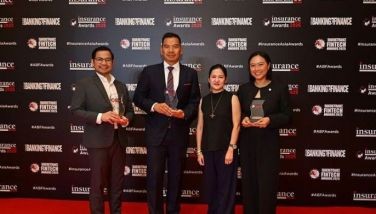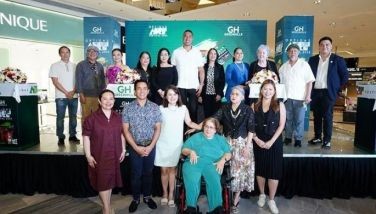Bajaus love affair with pearls
CEBU, Philippines - Most of the Bajaus have copper skin and golden brown hair. Locals and foreigners alike are impressed by their skills as pearl divers and jewelry makers. They scour even the deepest part of the sea and come back with shining pearls in their hands.
For most of their history, Bajaus have been a seafaring people, which explains why they are described as "sea gypsies". The seas are their comfort and an abundant source of livelihood. They travel from one place to another in search of abundant fishing grounds.
As time passes, many Badjaus have fled to the bustling city in search for greener pastures. In the process, they have adapted to the culture of the land-based communities.
In Sitio Puntod, Alaska Mambaling, Cebu City, are 140 Bajau families. Some of these women still wear traditional attires, with their babies clinging to their sides while doing household chores. Most of the men are at work or out at sea. They live a simple life amidst the hustle and bustle of the city.
Meet Jovelyn Amad, a Badjau cluster leader and a mother of three who hails from Zamboanga City. She has chosen to live in the city.
"We have a very simple life here. We are not pressured by what we see in the downtown area. We communicate in the same language and live with the same identity, culture, and heritage," she shared in Cebuano.
Even away from the wide open seas, Badjaus still have their connection with the sea. Apart from fishing and selling fruits, pearl making is one of the income-generating initiatives.
Jovelyn's husband, Rolly, is a pearl diver, while Jovelyn makes these pearls into accessories. The livelihood is passed on in their families from one generation to another.
"Both our parents are pearl divers and pearl jewelry makers. I remember as a child that I helped my parents in making accessories. Over time, I mastered making these pearl jewelry. And when my husband and I transferred to the city, we continued this livelihood," Amad stated. Her son, Jay-R, seven, also helps her in making pearl accessories.
The Amad family also runs a small eatery in the area, which adds to their daily income.
Like other Badjau families living in the area, the Amads buy strands of pearls of different sizes and colors from their relatives in Zamboanga City.
"We make earrings, bracelets, necklaces, and rings out of cultured pearls. Compared to malls and stores, ours are very cheap. Making pearl jewelry is one of the prides of the Badjau tribe. We are able to make them even without formal training," Jovelyn said, while sorting out strands of pearls.
Their stock of pearls come in round, semi-round, drop, pear and oval sizes and also of different sizes. Perfect round pearls are the rarest and the most valuable shape, according to Amad. Their colors include whitish, brownish and black.
"We often make jewelry out of black pearls. They are our bestsellers. As of now, our buyers prefer our earrings and necklaces," she said.
Amad stressed that their jewelry are sold at only Php100-300. Their prices could still be negotiated depending on the quantity buyers will buy.
However, due to low market demand, their income is also affected. According to Jovelyn, some people prefer plastic accessories than real pearls. They can even produce hundreds of them if they get orders from their clients.
She pointed out that pearls have brought food on their plates and that the Bajaus generate income from them rather than accessorize their bodies with these jewelry.
"We sell it to our friends. As of now, we do not have consistent buyers from the city. People only buy by piece from us. That is the challenge of the pearl making business for us, how to market it," Jovelyn explained.
Gatha Malalin, another Bajau, expressed her concerns over how to promote their products. Malalin believes that earning enough from making and selling pearl jewelry can help them provide better for their families.
"Because most of us here are dependent on this livelihood, we ourselves seek out ways to market our products. We build trust among our friends, sell to them, and assure them that every centavo they spend on the jewelry is worth it," Malalin added.
The Bajau community in Alaska Mambaling, Cebu City, through the intervention of the Badjau Integrated Area and Development Program (BIAD-P) of the Ramon Aboitiz Foundation Inc. (RAFI), now realizes that making pearl jewelry is an integral part of their identity as a people. The Bajaus are taking steps to preserve this and maintain a sense of pride from this livelihood.
"There is a change in mind-setting among the Badjaus. We become responsible members of the tribe. We learn to appreciate the distinct culture we have. And we are able to unlearn things to learn new things," Jovelyn stated.
Bajau leaders have established their community brand. They finally want to be called as "Wow Bajau" and be known as "Limpyo, Himsog, Hapsay, Aktibo, Edukado, Malamboon, ug Mapasigarbohong Tribong (clean, healthy, peaceful, active, educated, progressive, and proud) Bajau."
Some program interventions include educating the Badjaus on the importance of proper hygiene and community mind-setting. Parents also underwent responsible parenthood seminar and families were trained to establish backyard gardens to respond to the high malnutrition rate among the Bajau children.
"By working together, we will be one of the role model communities in the city. We realized how important community-building is, especially for our pearl jewelry-making to be sustainable for us," Jovelyn said. (FREEMAN)
- Latest
- Trending


















